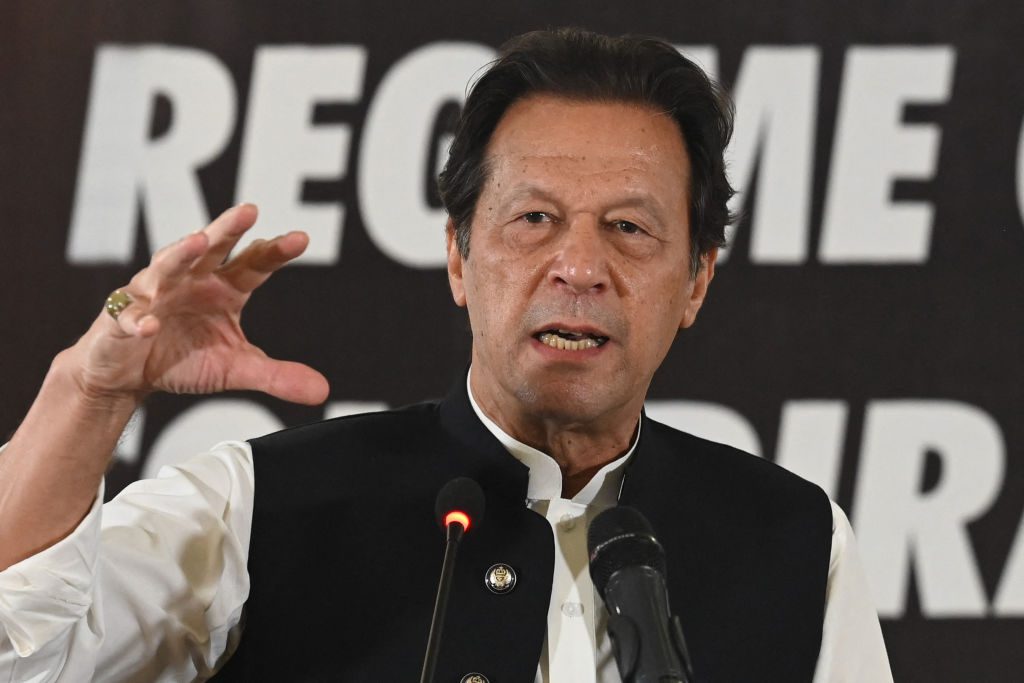- Wednesday, March 12, 2025

By: PTI
Pakistan’s ousted prime minister Imran Khan was granted protective bail till Thursday (25) by the Islamabad High Court in a terrorism case registered against him for threatening police, judiciary and other state institutions during a rally here on Saturday (20).
Khan, 69, was booked on Sunday under the Anti-Terrorism Act on Sunday (21).
Earlier in the day, Khan, chairman of the Pakistan Tehreek-e-Insaf (PTI) party, moved the court seeking pre-arrest bail in the case.
The petition filed by his lawyers Babar Awan and Faisal Chaudhry stated that Khan was a “target of the ruling PDM (Pakistan Democratic Movement) for his fearless criticism, and extremely bold and blunt stance against corruption and corrupt politicians”, the Dawn newspaper reported.
“And to achieve this malicious agenda, acting in a most unfortunate and clumsy manner, a false and frivolous complaint has been registered against him by the Islamabad Capital Territory (ICT) police at the behest of the incumbent government,” it added.
The plea further alleged that the government had decided to “cross all limits” to arrest Imran “under false accusations” and was “hell-bent to sort out the petitioner and his party at all costs”.
Justice Mohsin Akhtar Kayani took up the petition and asked what objections were raised on it. Awan informed the judge that an objection pertaining to approaching the relevant forum was raised on the plea. At that, Justice Kayani said an objection pertaining to biometrics was also raised.
During the proceedings, Awan claimed that “Imran’s residence has been surrounded and… he cannot even approach the relevant court”. Underlining that Khan had no past criminal record, the bail application stated that the former premier was ready for any investigation involved in the case, The Express Tribune newspaper reported.
Quoting sources at the registrar’s office, the report said that the office had raised three objections to Khan’s application for protective bail — first, he did not get his biometrics done; second he came to the high court instead of approaching an anti-terrorism court; and third, a certified copy of the terrorism case against him was not provided to the office. The case against Khan was registered at the Margalla Police Station of Islamabad.
The FIR said that at the PTI’s rally at F-9 park on Saturday, Khan had “terrorised and threatened top police officials and a respected female additional sessions judge” with the aim to stop them from performing their functions and abstain from pursuing any action against any individual related to his party.
It says that Khan’s speech had spread fear and uncertainty among the police, judges and the nation. In his address, Khan had threatened to file cases against top police officials, a woman magistrate, Election Commission of Pakistan and political opponents over the treatment meted out to his aide Shahbaz Gill, who was arrested last week on charges of sedition.
He had also taken exception to Additional District and Sessions Judge Zeba Chaudhry, who had approved Gill’s two-day physical remand at the request of the capital police, and said she should “prepare herself as action would be taken against her”. Khan’s pre-arrest bail application stated that the government, in an illegal effort to settle a political score, has decided to “illegally and unlawfully victimise” the petitioner.
Noting that the government had registered 17 FIRs against Khan, it said the most recent FIR against was “politically motivated”, in which the former prime minister had been “falsely” involved with “mala fide intention and ulterior motives to humiliate” him. Moreover, the plea highlighted that the FIR was registered after an “unexplained inordinate delay of 24 hours”.
“The contents of the FIR reflect that the alleged offence is not made out. The case in hand is of further inquiry”. The plea contended the case was based on “surmises and conjectures” and that no evidence was available on record against Imran in connection with the case. It also contended that there was no “direct or indirect” evidence available on record against Imran in the case, which created “serious doubt in the prosecution story”.